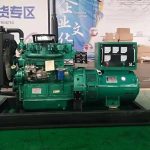Introduction
In today's modern world, access to reliable and continuous power supply is essential for both residential and commercial settings. However, power outages are a common occurrence due to various reasons such as natural disasters, grid failures, and maintenance issues. In such situations, having a backup power source becomes crucial to ensure uninterrupted operations. Diesel generators have emerged as a popular choice for providing backup power due to their reliability, efficiency, and cost-effectiveness. In this comprehensive guide, we will delve into the world of diesel generators, exploring their functionality, benefits, maintenance, and troubleshooting techniques to effectively address any issues that may arise.
Understanding Diesel Generators
Diesel generators are devices that convert diesel fuel into electrical energy through the process of combustion. They consist of an engine that runs on diesel fuel, an alternator that converts mechanical energy into electrical energy, a fuel system, a cooling system, and a control panel. These components work together to generate electricity when the primary power source fails or is unavailable.
One of the key advantages of diesel generators is their robustness and durability, making them suitable for heavy-duty applications in various industries such as construction, healthcare, telecommunications, and manufacturing. They are known for their high efficiency in converting fuel into electricity, making them a cost-effective choice for long-term power backup solutions.
Benefits of Diesel Generators
1. Reliability: Diesel generators are known for their reliability and ability to provide continuous power supply for extended periods. They are designed to start automatically when the main power source fails, ensuring uninterrupted operations.
2. Fuel Efficiency: Diesel generators are more fuel-efficient compared to other types of generators, resulting in lower operating costs over the long term. They consume less fuel per unit of power generated, making them a cost-effective choice for backup power solutions.
3. Longevity: Diesel generators are built to withstand high temperatures, heavy loads, and harsh operating conditions, making them durable and long-lasting. With proper maintenance, diesel generators can last for many years, providing a reliable power source during emergencies.
4. Easy Maintenance: Diesel generators are relatively easy to maintain compared to other types of generators. Routine maintenance tasks such as oil changes, filter replacements, and fuel system checks can help prolong the lifespan of the generator and ensure optimal performance.
5. Versatility: Diesel generators come in a wide range of sizes and power capacities, making them suitable for both residential and commercial applications. They can be used as primary or backup power sources depending on the specific requirements of the user.
Common Problems and Troubleshooting Techniques
While diesel generators are known for their reliability, they may encounter issues from time to time due to various factors such as lack of maintenance, fuel quality, environmental conditions, and component wear. It is essential to be aware of common problems that can occur with diesel generators and how to troubleshoot them effectively to ensure their optimal performance. Here are some of the most common problems associated with diesel generators and troubleshooting techniques:
1. Starting Issues: One of the most common problems with diesel generators is difficulty starting or failure to start. This can be caused by various factors such as a dead battery, fuel system issues, air in the fuel lines, or a faulty starter motor. To troubleshoot starting issues, check the battery voltage, inspect the fuel system for leaks or blockages, bleed the air from the fuel lines, and test the starter motor for proper operation.
2. Overheating: Diesel generators can overheat due to factors such as high ambient temperatures, insufficient cooling system capacity, dirty air filters, or restricted airflow. 300kw generator can cause damage to the engine and other components, leading to costly repairs. To troubleshoot overheating issues, check the coolant level, clean or replace the air filters, inspect the cooling system for leaks or blockages, and ensure proper airflow around the generator.
3. Low Power Output: If a diesel generator is producing low power output, it may be due to issues such as a clogged fuel filter, worn-out spark plugs, dirty fuel injectors, or a malfunctioning alternator. To troubleshoot low power output, inspect and replace the fuel filter, clean or replace the spark plugs, inspect and clean the fuel injectors, and test the alternator for proper operation.
4. Fuel Contamination: Diesel fuel can become contaminated over time due to factors such as water intrusion, microbial growth, or sediment buildup in the fuel tank. Contaminated fuel can cause issues such as engine stalling, poor performance, and component damage. To troubleshoot fuel contamination issues, drain and clean the fuel tank, replace the fuel filter, and use fuel additives to prevent microbial growth and water intrusion.
5. Exhaust Smoke: Excessive exhaust smoke from a diesel generator can indicate issues such as incorrect fuel-to-air ratio, worn-out piston rings, or fuel system problems. Different colors of exhaust smoke (black, white, or blue) can signify specific issues with the engine. To troubleshoot exhaust smoke issues, inspect the fuel system for leaks or blockages, check the air intake system for restrictions, and conduct a compression test to check the condition of the piston rings.
Conclusion
Diesel generators play a crucial role in providing backup power during emergencies and ensuring uninterrupted operations in residential and commercial settings. Their reliability, efficiency, and cost-effectiveness make them a popular choice for a wide range of applications. By understanding the functionality, benefits, maintenance, and troubleshooting techniques of diesel generators, users can effectively address any issues that may arise and maximize the performance and lifespan of their generators. With proper care and maintenance, diesel generators can serve as a reliable and long-lasting power source for years to come.

